by Darpan Sachdeva

It is with a heavy heart that we bid farewell to one of India’s most iconic industrialists and philanthropists, Mr. Ratan Tata. His passing marks the end of an era, but his legacy will continue to inspire generations of entrepreneurs and leaders worldwide. As we reflect on his remarkable life, we can draw invaluable lessons that apply not only to business but to our journey as human beings.
A Visionary Leader with a Heart of Gold
Ratan Tata’s life was a testament to the power of visionary leadership combined with unwavering compassion. He transformed the Tata Group from a national powerhouse into a global conglomerate, all while maintaining a deep commitment to social responsibility and ethical business practices. His approach teaches us that success and social good are not mutually exclusive – in fact, they can and should go hand in hand.
Lesson 1: Dream Big, Act Bigger
“Dream Big, Act Bigger” epitomizes Ratan Tata’s approach to business and life. His acquisition of Jaguar Land Rover in 2008, when many doubted its viability, transformed the struggling brand into a global success. The launch of the Tata Nano, envisioned as the world’s most affordable car, showcased his commitment to inclusive innovation.
But Tata’s dreams extended beyond business. His philanthropic efforts, like the Tata Trusts, which donate 66% of their income to charitable causes, demonstrate his vision for a better society. The Tata Cancer Hospital, providing affordable care to thousands, is a testament to his compassion.
Tata’s ability to turn ambitious ideas into reality serves as an inspiration to entrepreneurs worldwide. His journey teaches us that no dream is too big if pursued with unwavering determination and strategic thinking. Whether it’s revolutionizing an industry or addressing societal challenges, Tata’s legacy encourages us to think beyond conventional boundaries.
For aspiring entrepreneurs, this serves as a powerful reminder to set ambitious goals and work tirelessly towards them. Don’t be afraid to think outside the box and challenge the status quo. Your ideas, no matter how unconventional, could be the next big innovation that changes the world.
Lesson 2: Ethics and Integrity are Non-Negotiable

Throughout his career, Ratan Tata was known for his unwavering commitment to ethics and integrity. He famously said,
“I don’t believe in taking right decisions. I take decisions and then make them right.”
This philosophy underscores the importance of standing by your choices and ensuring they align with your values.
Tata’s commitment to integrity was evident in his handling of the Tata Nano project. Despite facing numerous challenges and setbacks, he refused to compromise on safety standards or cut corners to reduce costs. This dedication to quality and ethics, even at the expense of profitability, set a powerful example for businesses worldwide.
Another instance of Tata’s ethical leadership was his response to the 2008 Mumbai terror attacks. He personally supervised relief efforts and ensured that all affected employees and their families received support, going far beyond legal obligations. This compassionate approach demonstrated that business leaders can prioritize humanity alongside profitability.
Tata’s legacy teaches us that ethical business practices are not just morally right but also crucial for long-term success and respect in the global market. His life serves as an inspiration for entrepreneurs to prioritize integrity, even when faced with difficult decisions or short-term losses.
Lesson 3: Embrace Innovation and Adaptability
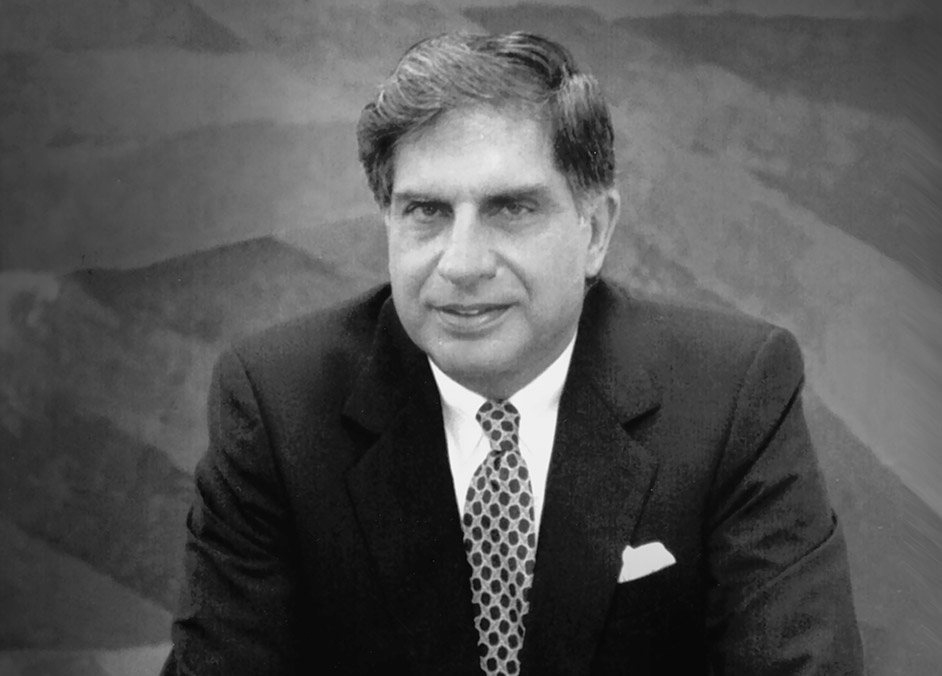
Under Ratan Tata’s visionary leadership, the Tata Group exemplified the power of innovation and adaptability in the ever-evolving business landscape. Tata’s forward-thinking approach led to groundbreaking ventures that reshaped industries and improved lives globally.
A prime example is the development of the Tata Nano, the world’s most affordable car, which revolutionized personal transportation in India. This innovative solution addressed the needs of millions, demonstrating Tata’s commitment to accessible technology.
Tata also spearheaded the group’s expansion into the IT sector with Tata Consultancy Services (TCS), which grew to become one of India’s largest IT companies and a global leader in digital solutions. This move showcased Tata’s ability to recognize and capitalize on emerging trends.
Furthermore, Tata’s acquisition of Jaguar Land Rover in 2008 demonstrated his adaptability in the face of economic challenges. By revitalizing the struggling brands, Tata transformed them into profitable, innovative automakers.
Ratan Tata’s legacy teaches entrepreneurs that embracing innovation and adaptability is crucial for long-term success. By continuously evolving, exploring new markets, and developing solutions that address real-world needs, businesses can stay relevant and create lasting impact in an ever-changing global economy.
For modern entrepreneurs, this lesson is more relevant than ever. In a rapidly evolving global economy, the ability to innovate and adapt is crucial for survival and growth. Stay curious, invest in research and development, and be willing to pivot when necessary.
Lesson 4: Prioritize Social Responsibility
Perhaps the most inspiring aspect of Ratan Tata’s legacy is his unwavering commitment to social responsibility. The Tata Group, under his leadership, consistently allocated a significant portion of its profits to philanthropic causes, focusing on education, healthcare, and rural development.
Tata’s vision of ‘giving back’ manifested in numerous groundbreaking initiatives. The Tata Trusts, India’s oldest philanthropic organization, has been instrumental in transforming millions of lives. For instance, the Tata Memorial Hospital, established in 1941, continues to provide world-class cancer care, often at subsidized rates. During the 2008 Mumbai terror attacks, Tata personally supervised relief efforts and ensured that all affected employees and their families received support, exemplifying leadership that goes beyond business.
Ratan Tata’s approach to social responsibility extends to sustainable business practices. The development of the Nano car aimed to provide affordable transportation to millions, while initiatives like Tata Swach sought to address the critical need for clean drinking water in rural areas.
These examples underscore a powerful lesson for global entrepreneurs: true success lies not just in profit margins, but in the positive impact a business can have on society. Tata’s legacy proves that compassionate capitalism can drive both business growth and social progress.
As entrepreneurs, we have the power to create positive change in our communities and the world at large. Integrating social responsibility into your business model not only helps those in need but also builds a strong, positive brand image and fosters employee engagement.
Lesson 5: Lead with Humility and Empathy
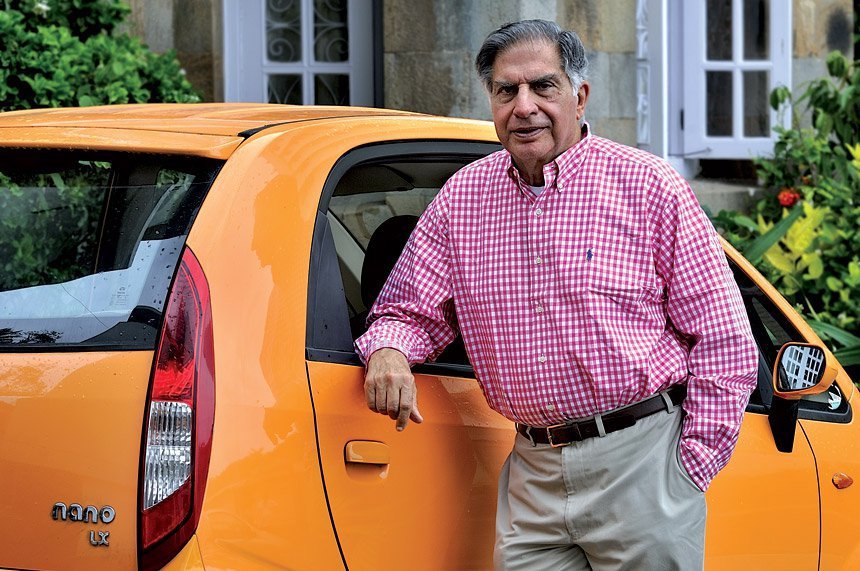
Ratan Tata’s legacy is a testament to the power of humble leadership and genuine empathy. Despite his immense success and influence, he consistently demonstrated a remarkable ability to connect with people at all levels. One striking example is when Tata personally visited the families of employees affected by the 2008 Mumbai terror attacks, offering comfort and support during their darkest hours.
His empathy extended beyond crisis situations. Tata was known for regularly engaging with factory workers, listening to their concerns, and implementing changes to improve their working conditions. This hands-on approach fostered a sense of belonging and loyalty among employees across the Tata Group.
Tata’s humility was evident in his lifestyle choices as well. He often flew economy class and drove his own modest car, eschewing the trappings of wealth that typically accompany his stature. This down-to-earth nature made him approachable and relatable to people from all walks of life.
By leading with humility and empathy, Tata created a positive work culture that not only drove the company’s success but also inspired a generation of entrepreneurs to prioritize human values in business. His approach proves that true leadership is not about wielding power, but about uplifting others and creating a lasting positive impact.
For aspiring leaders, this serves as a powerful reminder that true leadership is about serving others, not just commanding them. Cultivate empathy, listen to your team, and lead by example. A leader who cares about their people will inspire loyalty and dedication that no amount of authority can match.
Lesson 6: Perseverance in the Face of Adversity
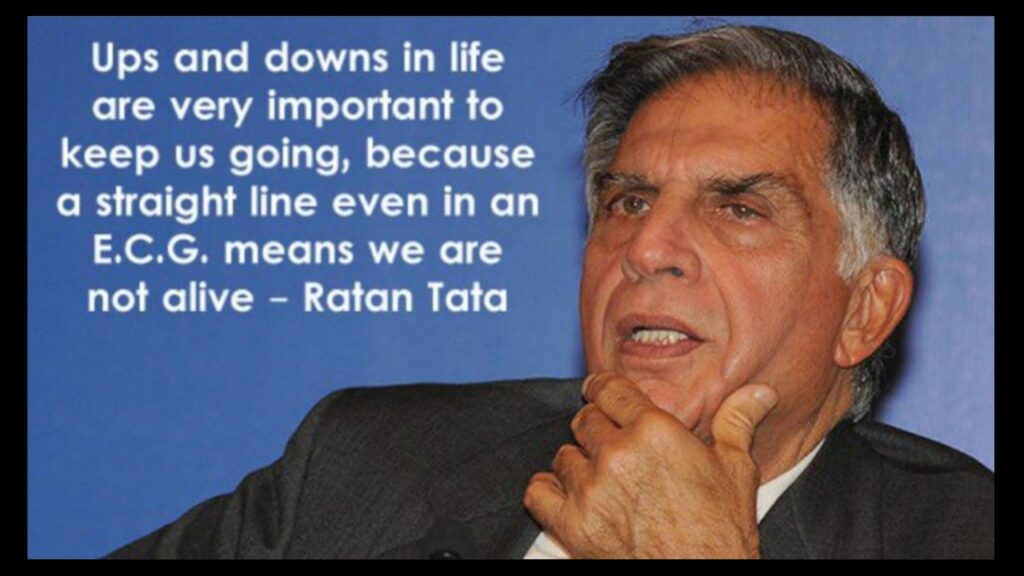
Ratan Tata’s journey exemplifies this vividly. When he took over as Chairman of Tata Group in 1991, India was facing an economic crisis, and the conglomerate was struggling. Instead of retreating, Tata boldly led the company through liberalization, transforming it into a global powerhouse.
A prime example of his resilience was the development of the Tata Nano, the world’s cheapest car. Despite numerous setbacks, including political opposition and manufacturing challenges, Tata persevered. When violent protests forced the company to relocate its factory, he didn’t give up but found an alternative site, demonstrating his unwavering commitment to his vision.
Another instance was Tata’s acquisition of Jaguar Land Rover in 2008, during the global financial crisis. Many criticized this move, but Tata’s foresight and determination turned the struggling brands into profitable entities.
Tata’s perseverance extended beyond business. He continued philanthropic efforts even in tough times, believing in giving back to society. His resilience in the face of adversity, coupled with his ethical approach to business, serves as an inspiring model for entrepreneurs worldwide, proving that success and integrity can go hand in hand.
This resilience is a crucial trait for any entrepreneur. The road to success is rarely smooth, and setbacks are inevitable. It’s how we respond to these challenges that defines us. Take inspiration from Tata’s perseverance and view obstacles as opportunities for growth and learning.
Lesson 7: Nurture Young Talent
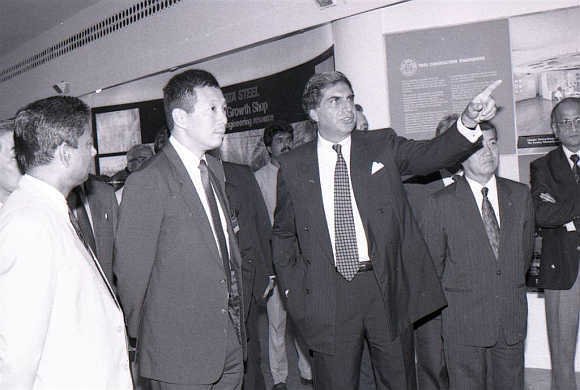
Ratan Tata’s commitment to fostering young talent has been a hallmark of his later career, inspiring entrepreneurs worldwide. As a prominent angel investor, he has backed over 50 startups, including groundbreaking companies like Ola Electric, Paytm, and Snapdeal. His investments span diverse sectors, from e-commerce to clean energy, demonstrating his faith in innovation across industries.
Beyond financial support, Tata actively mentors young entrepreneurs, sharing his vast experience and wisdom. He established the Tata Innovation Fellowship program, which identifies and supports promising researchers in life sciences and biotechnology. Additionally, the Tata Trusts’ Foundation for Innovation and Social Entrepreneurship (FISE) provides a platform for social entrepreneurs to scale their impact.
Tata’s approach to nurturing talent extends to education as well. He donated $50 million to Harvard Business School and $25 million to Cornell University, emphasizing the importance of quality education in shaping future leaders.
By consistently supporting and guiding the next generation of innovators, Ratan Tata exemplifies how established business leaders can play a crucial role in shaping the future of entrepreneurship and driving positive change in society.
As successful entrepreneurs, we have a responsibility to mentor and support those who are just starting their journey. Share your knowledge, provide guidance, and invest in promising ideas. By nurturing young talent, we can create a thriving ecosystem of innovation and entrepreneurship.
A Lasting Legacy of Inspiration
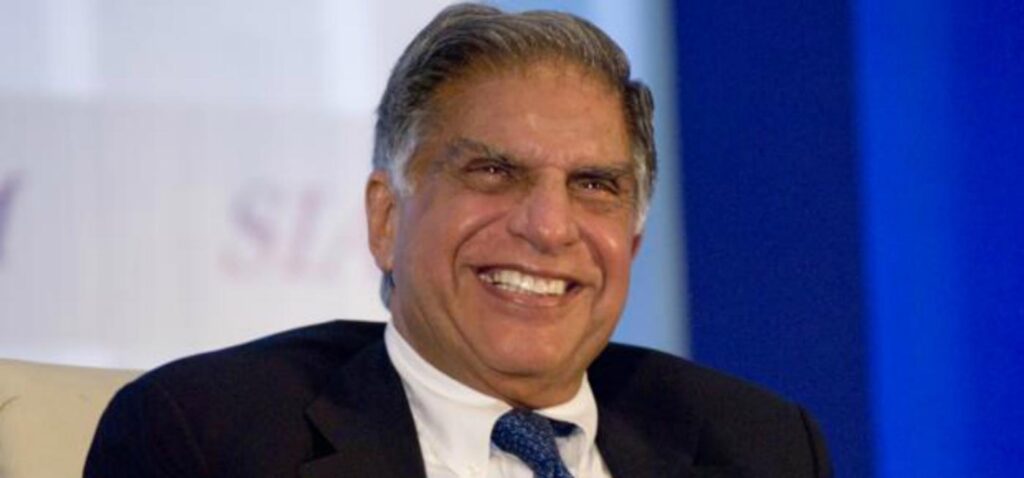
As we bid farewell to Ratan Tata, we are reminded of the profound impact one individual can have on the world. His life serves as a blueprint for how to build a successful business empire while maintaining a strong moral compass and commitment to social good.
For me personally, Ratan Tata has been a source of immense inspiration throughout my entrepreneurial journey. His ability to balance business acumen with social responsibility, his unwavering integrity, and his visionary leadership have set a standard that I strive to emulate in my own endeavours.
As we move forward, let us carry the lessons from Ratan Tata’s life in our hearts and minds. Let us dream big, act with integrity, embrace innovation, prioritize social responsibility, lead with empathy, persevere through challenges, and nurture the next generation of leaders.
In doing so, we not only honour the legacy of a great man but also contribute to building a better, more compassionate world – a world where business success and social good go hand in hand, just as Ratan Tata envisioned.
Rest in peace, Mr. Tata. Your life has been a gift to us all, and your legacy will continue to inspire generations to come. Thank you for showing us the true meaning of visionary leadership and compassionate entrepreneurship. Your light will forever shine bright in the annals of business history and in the hearts of millions you’ve touched.
 Darpan Sachdeva is the CEO and Founder of Nobelthoughts.com. Driven by a profound dedication to Entrepreneurship, Self-development, and Success over an extended period, Darpan initiated his website with the aim of enlightening and motivating individuals globally who share similar aspirations. His mission is to encourage like-minded individuals to consistently pursue success, irrespective of their circumstances, perpetually moving forward, maintaining resilience, and extracting valuable lessons from every challenge.
Darpan Sachdeva is the CEO and Founder of Nobelthoughts.com. Driven by a profound dedication to Entrepreneurship, Self-development, and Success over an extended period, Darpan initiated his website with the aim of enlightening and motivating individuals globally who share similar aspirations. His mission is to encourage like-minded individuals to consistently pursue success, irrespective of their circumstances, perpetually moving forward, maintaining resilience, and extracting valuable lessons from every challenge.


